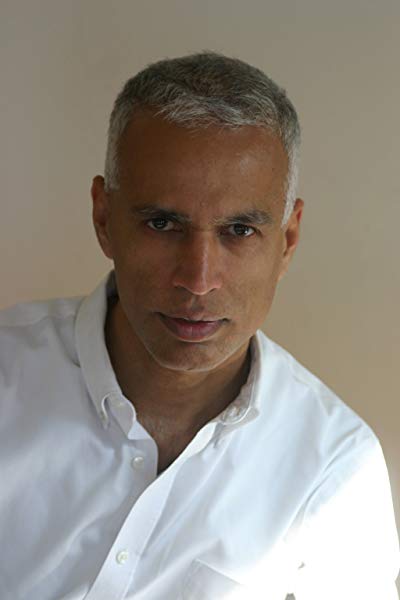Manil Suri

Manil Suri born in Mumbai, India. His father is an assistant music director in a nascent Bollywood, and his mother teaches history (after having been Indira Gandhi's secretary). They live in a one-room apartment with a shared kitchen. His mother's family are Hindu refugees from Pakistan after Partition.
"As a child I didn't even know what privacy meant," Suri will say later, without a trace of bitterness. "Going back now, I certainly feel the lack of it. But as a child I just escaped into my imagination. It was actually very good training for being a mathematician or a writer. All we need is a little room where we can think."
MS begins schooling, at a "'rather fancy school' that his parents struggled to afford." Most of his reading is of books from a library.
MS rebels against the strict religiosity of his father. Up to this point he participated in all Hindu festivals.
MS is graduated from the University of Bombay with a B.Sc. in Mathematics.
MS earns an M.S. in Mathematics from U of B.
MS moves to the United States, where he comes out as gay.
MS earns a Ph.D. in Mathematics from Carnegie-Mellon University.
MS takes a position as an Assistant Professor of Mathematics at the University of Maryland, Baltimore County.
MS writes his first short story. Later he will claim that writing is a way for him "to escape the horror of being a mathematician." His wry, self-deprecating sense of humor is evident when he writes that "it is rumored that he also complains frequently to his colleagues of the horror of being a writer, declaring mathematics to be his only escape."
For the next ten years he will write more stories, and send a number of them out for consideration by journals. All will be rejected.
MS also attends several writing workshops while keeping his creative writing hidden from his colleagues. His instructors include Michael Cunningham and Vikram Chandra.
MS is tenured and promoted to Associate Professor at UMBC.
MS is promoted to full professor at UMBC.
MS has his first story, "The Tyranny of Vegetables," published (in Cyrillic, which he cannot read) in a Bulgarian literary journal.
MS starts "The Death of Vishnu" as a short story.
MS's fist novel, The Death if Vishnu, is excerpted in The New Yorker. The excerpt sparks a bidding war among publishers, with W.W. Norton emerging offering a $350,000 advance.
The Death of Vishnu wins the Ralph Heyne Corrine Buchpreis (Germany), a Pen-Bingham Fellowship for 2002-04, and is a New York Times Notable Book for 2001. It is also a finalist for the PEN/Faulkner award and is long-listed for the Booker Prize (U.K.).
The Death if Vishnu wins the Barnes and Noble Discover Prize and the McKittrick Prize (U.K.).
MS begins to consider The Death of Vishnu as the beginning of a trilogy about the Hindu Trinity: Vishnu, Shiva, and Brahma. The third book in the trilogy will eventually address Devi, not Brahma
MS is awarded a Guggenheim Fellowship for Fiction.
The Age of Shiva is published. It is well-received. Kiran Desai says of it:
"In The Age of Shiva India's birth as a new nation parallels a woman's complex psychological journey confronting tradition and modernity. Exchanging sentimentality for clear vision, Suri reveals an immense humanity, and a tenderness for women making their way in a world of men. Drawn by this compelling narrative, I read this marvelous book in one sitting."
MS begins collaborating with Michelle Osherow, fellow UMBC member and the dramaturg for the Folger Shakespeare Theater (in Washington DC). He is the mathematical consultant for the Folger's production of Tom Stoppard's Arcadia.
MS gives the Blazer Lecture in the Humanities at the University of Kentucky.
The City of Devi is published, completing the trilogy. Indian reviewers balk at the open portrayal of homosexuality, while most Western reviewers praise the text. Gary Shteyngart, author of Super Sad True Love Story and Absurdistan, is particularly pointed and effusive:
"The City of Devi is so exuberant and sexy, one may wish to purchase a prophylactic alongside it. When the world comes to an end, I will spend my last days in Mumbai clutching a copy of Manil Suri's dazzling epic."
MS wins the "Bad Sex in Fiction" prize for the climactic sex scene in The City of Devi. However, reviewers in The Wall Street Journal and The Times Literary Supplement praised the sex writing in the book.
MS publishes the first in a number of Opinion/Editorial pieces on mathematics, in The New York Times.
MS is awarded the status of Distinguished University Professor by UMBC.
MS is appointed a contributing opinion writer for The New York Times.
MS is revising drafts of his forthcoming novel, The Godfather of Numbers.
Could you ever see yourself teaching writing?
No, I couldn't. I tried it once at American University. I was invited to give a talk, and they asked me to lead a workshop, so I did. I found the experience incredibly difficult. The reason for that is that in math, there is one answer, and I have it. If you don't agree, then too bad. Writing is nothing like that. "On one level, your story doesn't work, but not to worry, I just loved your use of prepositions." One constantly has to figure out how to give positive feedback since people have poured their hearts into their pieces! In math, a wrong answer doesn't lead to great soul-searching -- an answer is right or it's wrong -- it's not a judgment call, it just is. When I taught that shared seminar with my English colleague, I found evaluating all those essays much harder than something completely objective like math problem sets.